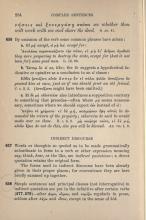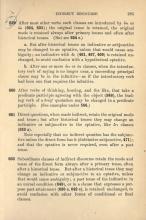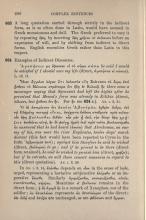657. Words or thoughts so quoted as to be made grammatically subordinate in form to a verb or other expression meaning say, think, hear,or the like, are indirect quotations; a direct quotation retains the original form. The forms used in indirect discourse have been already given in their proper places; for convenience they are here briefly summed up together.
658. Simple sentences and principal clauses (not interrogative) in indirect quotation are put in the infinitive after certain verbs (§§ 577 – 579)—after φημι, οἴομαι, and νομίζω regularly in prose, seldom after λέγω and εἶπον, except in the sense of bid.
659. After most other verbs such clauses are introduced by ὅτι or ὡς (§§ 624, 635); the original tense is retained, the original mode is retained always after primary tenses and often after historical tenses. (But see § 624.c.)
a. But after historical tenses an indicative or subjunctive may be changed to an optative, unless that would cause ambiguity; an indicative with ἄν (§§ 461, 467, 469) is retained unchanged, to avoid confusion with a hypothetical optative.
b. After one or more ὅτι or ὡς clauses, when the introductory verb of saying is no longer near, a succeeding principal clause may be in the infinitive—as if the introductory verb had been one that requires the infinitive.
660. After verbs of thinking, hearing, and the like, that take a predicate participle agreeing with the object (§ 586), the leading verb of a brief quotation may be changed to a predicate participle. (See examples under § 586.)
661. Direct questions, when made indirect, retain the original mode and tense; but after historical tenses they may change an indicative or subjunctive to the optative, like ὅτι clauses (§ 659.a). Note especially that no indirect question has the subjunctive unless the direct form has it (dubitative subjunctive, § 471); and that the optative is never required, even after a past tense.
662. Subordinate clauses of indirect discourse retain the mode and tense of the direct form always after a primary tense, often after a historical tense. But after a historical tense they may change an indicative or subjunctive to an optative, unless that would cause ambiguity; a past tense of the indicative in an unreal condition (§ 649), or in a clause that expresses a purpose past attainment (§§ 636.c, 642.c), is retained unchanged, to avoid confusion with other forms of conditional or final clauses.
663. A long quotation carried through strictly in the indirect form, as is so often done in Latin, would have seemed in Greek monotonous and dull. The Greek preferred to vary it by repeating ἔφη, by inserting ἔφη χρῆναι or ἐκέλευσε before an expression of will, and by shifting from indirect to direct forms. English resembles Greek rather than Latin in this respect.
664. Examples of Indirect Discourse.
Ἀγαπήσειν με ἔφασκεν εἰ τὸ σῶμα σώσω.
He said I would be satisfed if I should save my life (direct, ἀγαπήσεις εἰ σώσεις).
Lysias 12.12
Ἧκεν ἄγγελος λέγων ὅτι λελοιπὼς εἴη Συέννεσις τὰ ἄκρα, ἐπεὶ ᾔσθετο τὸ Mένωνος στράτευμα ὅτι ἤδη ἐν Κιλικίᾱͅ ἦν.
There came a messenger saying that Syennesis had left the heights after he perceived that Menonʼs force was already in Kilikia (direct, λέλοιπε, ἐπεὶ ᾔσθετο ὅτι ἦν. For ἦν see § 624.c).
Xen. Anabasis 1.2.21
Ὁ δὲ ἀπεκρῑ́νατο ὅτι ἀκούοι Ἀβοκόμᾱν, ἐχθρὸν ἄνδρα, ἐπὶ τῷ Eὐφρᾱ́τῃ ποταμῷ εἶναι, ἀπέχοντα δώδεκα σταθμούς· πρὸς τοῦτον οὖν ἔφη βούλεσθαι ἐλθεῖν· κᾱ̉̀ν μὲν ᾖ ἐκεῖ, τὴν δίκην ἔφη χρῄζειν ἐπιθεῖναι αὐτῷ, ἢν δὲ φεύγῃ, ἡμεῖς ἐκεῖ πρὸς ταῦτα βουλευσόμεθα.
He answered that he had heard (ἀκούω) that Abrokomas, an enemy of his, was near the river Euphrates, twelve daysʼ march distant (this fact would have been reported to Cyrus in the form Ἀβροκόμᾱς ἐστί); against him therefore he said he wished (direct, βούλομαι) to go; and if he proved to be there (direct form retained), he said he wished to punish him (direct, χρῄζω); but if he retreats, we will there concert measures in regard to this (direct quotation).
Xen. Anabasis 1.3.20
In Xen. Anabasis 1.3.14, ἑλέσθαι depends on εἶπε in the sense of bade, urged, representing a hortative subjunctive ἑλώμεθα or an imperative ἕλεσθε. Similarly ἀγοράζεσθαι, συσκευάζεσθαι, αἰτεῖν, συντάττεσθαι, πέμψαι.
Meantime εἰ βούλεται remains in the direct form; ἡ δὲ ἀγορᾱ̀ ἦν is a remark of Xenophon, not of the soldier; ὡς ἀποπλέοιεν represents ὡς ἀποπλέωμεν of the direct; ἐν διδῷ and ἀπάξει are unchanged, as are φθάσωσι and ἔχομεν.



